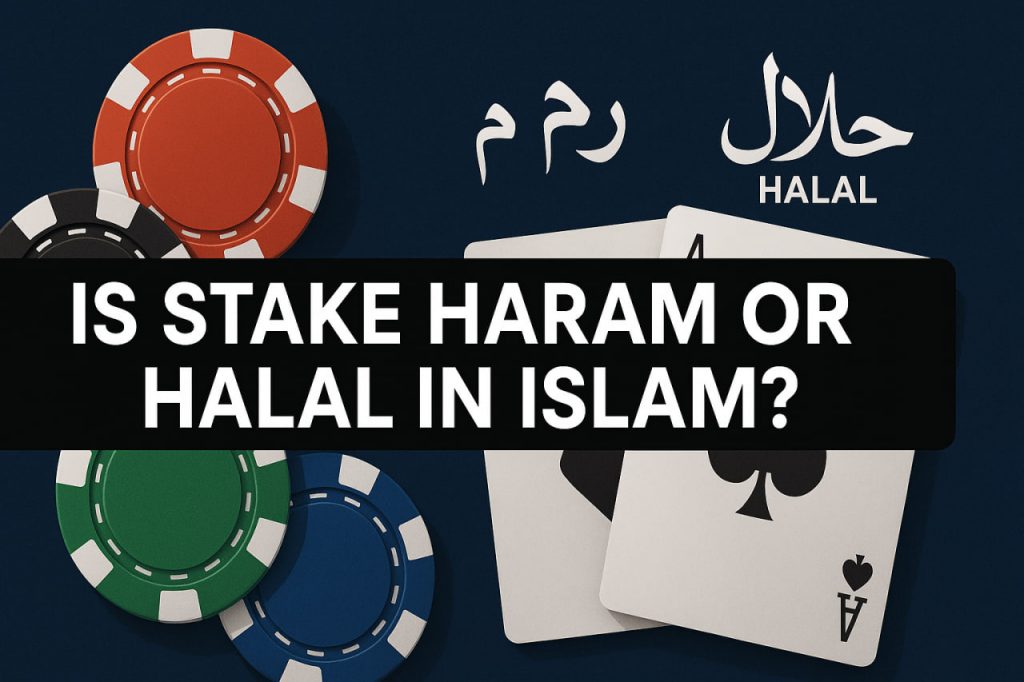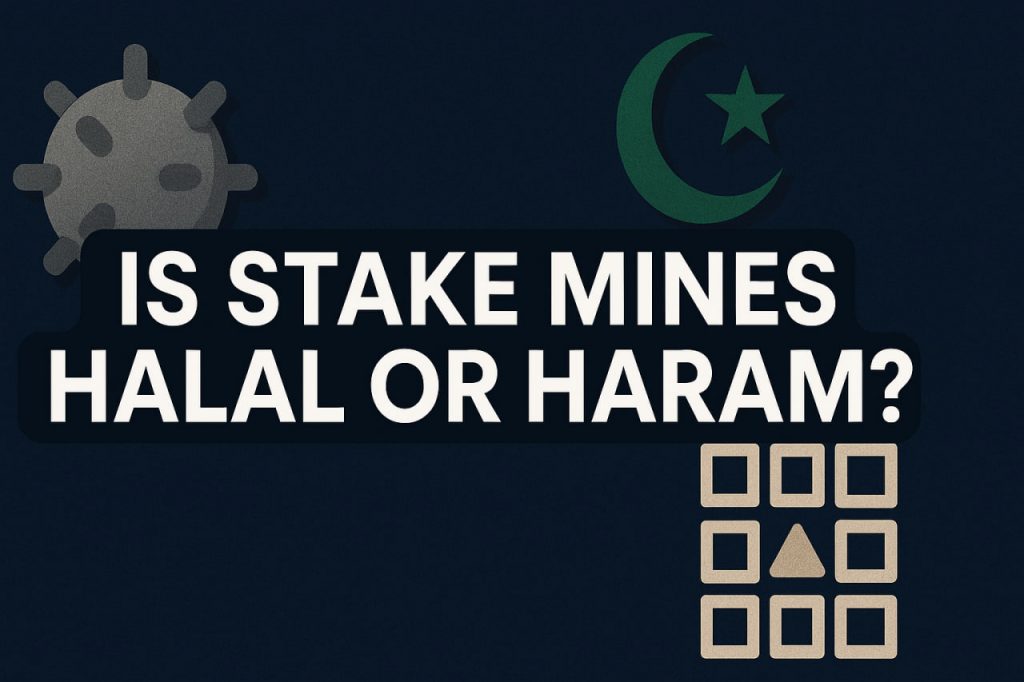Is Stake Haram or Halal in Islam?

In recent years, online gambling and crypto-based gaming platforms have gained significant traction, particularly among tech-savvy and younger demographics. These platforms offer fast-paced entertainment, global access, and opportunities to earn digital income through games of chance and betting systems. Among the most talked-about of these platforms is Stake.com, a cryptocurrency-based online casino that features games such as sports betting, online slots, live dealer games, and the widely known “Stake Mines.”
But the central question for many Muslims remains: Is Stake haram or halal in Islam? This concern is not just about the legality of such platforms but centers around the ethical and religious implications defined by Islamic jurisprudence. In this comprehensive article, we will delve deep into this question, examining Islamic rulings, scholarly interpretations, and ethical concerns, while also breaking down how the Stake platform operates. We will also provide alternative halal entertainment options, expert insights, and guidance on how to ensure that your digital habits align with your faith.
What is Stake.com?
Stake.com is a well-known online casino and sports betting site that operates entirely through cryptocurrency. Founded in 2017, Stake quickly rose in popularity due to its sleek interface, rapid payment system, community features, and wide variety of games. The platform supports transactions in Bitcoin, Ethereum, Litecoin, Dogecoin, and other popular cryptocurrencies.
Features of Stake
- Sports Betting: Includes real-time and future bets on soccer, basketball, MMA, tennis, and more.
- Casino Games: Slots, roulette, blackjack, baccarat, and other traditional casino offerings.
- Original Stake Games: Games like Stake Mines, Crash, Plinko, and Limbo are designed in-house and offer unique gameplay.
- Live Casino: Real dealers, live video streams, and social interaction add realism to online gambling.
- Community Chat & Bonuses: Stake offers chat features, VIP rewards, and cashback bonuses to maintain user engagement.
- Affiliate Program: Users can earn commissions by referring others to the platform, further spreading its reach.
While Stake.com excels in design and user engagement, these features should be evaluated not only through the lens of innovation but through Islamic ethical standards.
Is Stake Haram in Islam?
Answering the question “Is Stake haram in Islam?” requires us to explore multiple Islamic principles related to financial ethics, gambling, and morality.
Core Islamic Principles to Consider
1. Maisir (Gambling)
The Qur’an unequivocally forbids gambling:
“O you who have believed, indeed, intoxicants, gambling, [sacrificing on] stone alters [to other than Allah], and divining arrows are but defilement from the work of Satan, so avoid it that you may be successful.” (Surah Al-Ma’idah 5:90)
Gambling, or Maisir, involves gaining money through games of chance, without any productive effort. This is the very foundation upon which Stake operates.
2. Gharar (Uncertainty or Speculation)
Islam forbids excessive risk and uncertainty in commercial transactions. Gharar refers to situations where the outcome is unknown or purely speculative. Most activities on Stake, such as casino games and sports betting, involve Gharar and are thus deemed impermissible.
3. Haram Earnings
Money earned through gambling is classified as haram and must not be consumed or used. Engaging with Stake directly contradicts the concept of earning through ethical, honest means. It is not just the act of gambling that is forbidden, but also profiting from it in any form.
4. Promotion of Unethical Behavior
Gambling promotes addiction, financial instability, and the illusion of getting rich quickly. It often targets vulnerable individuals, which conflicts with the Islamic principle of social welfare. These platforms utilize psychologically manipulative techniques to retain users.
Scholarly Opinions

Islamic scholars across all major schools of thought (Hanafi, Shafi’i, Maliki, Hanbali) agree that gambling is strictly haram. Contemporary scholars have extended this prohibition to include all forms of online gambling, including platforms like Stake.com, regardless of the currency used. Additionally, institutions like Al-Azhar, Dar al-Ifta, and numerous Islamic finance boards have issued fatwas against all forms of online gambling.
Stake is Halal or Haram? Detailed Breakdown
To better understand the Islamic ruling on Stake.com, here’s a breakdown of its core features and their classification according to Shariah:
| Feature | Description | Islamic Verdict |
|---|---|---|
| Sports Betting | Betting on outcomes of sports events using crypto or money | Haram |
| Online Casino | Traditional casino games involving chance and betting | Haram |
| Stake Mines | In-house game involving luck and betting | Haram (resembles games of chance) |
| Cryptocurrency Use | Medium for deposits and withdrawals | Neutral, but haram in gambling use |
| Cashback & Promotions | Designed to encourage continuous gambling | Haram (incentivizes haram behavior) |
| VIP Programs | Rewards loyal gamblers with perks and bonuses | Haram (encourages prolonged gambling) |
| Affiliate Marketing | Earning by referring others to gamble | Haram (facilitating haram acts) |
This detailed table addresses the commonly asked variations of the question: “Stake is halal or haram?”, “Stake halal or haram?”, or “Is Stake haram in Islam?” — and in every case, the answer is consistent: haram.
Is Stake Mines Halal or Haram?
Stake Mines is a popular game on Stake.com that mimics the classic Minesweeper format. You choose tiles to uncover and avoid hidden mines. The more tiles you successfully reveal, the greater your payout. However, one mistake leads to total loss.
Why Stake Mines is Haram:
- Requires staking money or crypto to play
- Outcomes are based entirely on chance, not skill
- Encourages repeated play and addictive behavior
- Includes risk of total loss with each incorrect move
- Gamifies gambling with colorful visuals and dopamine-driven feedback loops
Verdict:
Is Stake Mines halal or haram? It is haram, as it fulfills all the conditions of prohibited gambling in Islam.

Is the Stake App Halal or Haram?
The Stake app is a mobile extension of the Stake platform, offering the same gambling activities in a more accessible format.
Concerns With the Stake App:
- Promotes instant access to haram activities
- Sends notifications that psychologically re-engage users
- Facilitates gambling in private or hidden environments
- Uses mobile convenience to bypass time limits or personal restrictions
Verdict:
Stake app is haram in Islam, just like the platform itself. Making it mobile does not change the underlying nature of the activities it facilitates.
Halal Alternatives to Stake
Instead of engaging in gambling activities, Muslims can explore a wide array of halal alternatives that offer entertainment, competition, and financial gain within the bounds of Islamic law.
Halal Entertainment:
- Skill-based games: Chess, Scrabble, sudoku, and trivia games
- Educational platforms: Learning apps for languages, coding, or general knowledge
- Creative outlets: Art, music production (permissibility may vary), and storytelling platforms
Halal Income Sources:
- Invest in Shariah-compliant funds: Through platforms like Wahed Invest, Zoya, and ShariaPortfolio
- Remote Freelancing: Offer services in design, development, writing, consulting, or digital marketing
- Start a Halal Business: Launch a product-based or service-based business that is ethical and permissible
Halal Competitions:
- Competitions where prizes are provided by a third party, and participation does not involve gambling, are generally halal
- Online courses and hackathons that award merit-based prizes can be great learning experiences and income sources
Final Thoughts
While platforms like Stake.com may offer exciting games, sleek interfaces, and quick returns, they come at a heavy spiritual cost. Engaging with gambling platforms undermines the ethical principles of Islam, promotes financial harm, and leads to emotional and mental challenges such as addiction and regret.
Gambling is unequivocally haram, whether conducted offline or online, with fiat money or cryptocurrency. Muslims are advised to seek halal forms of recreation, income, and competition that promote well-being and align with their faith.
